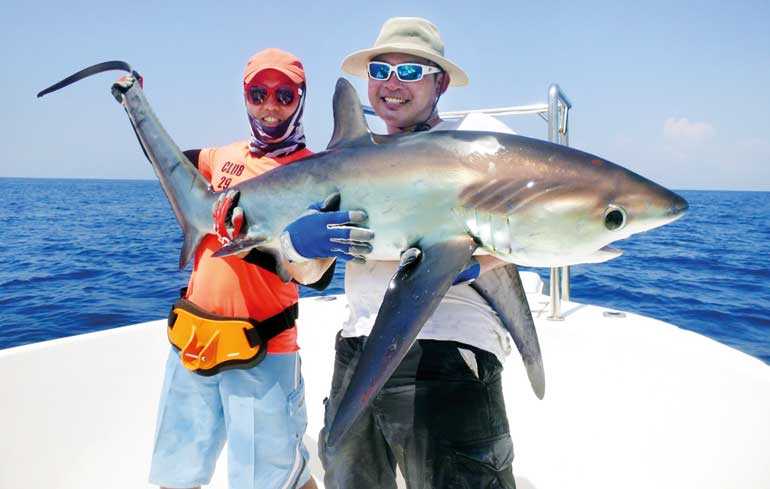Saturday Feb 28, 2026
Saturday Feb 28, 2026
Saturday, 11 August 2018 01:54 - - {{hitsCtrl.values.hits}}
The Fisheries and Aquatic Resources Act, No. 2 of 1996 (as amended on 14 October 2015 under Section 61) states that: No person engaged in fishing operations in Sri Lanka Waters shall catch any shark of the species specified in the Schedule hereto except for the collection of museum, biological sampling for taxonomic study and research purposes…
1. Shark species of the Family Alopidae:
Alopias vulpinus (Thresher shark)
Alopias superciliosus (Big-eye thresher shark)
Alopias pelagicus (Pelagic theresher shark)
2.Carcharhinus Iongimanus (Oceanic white-tip shark)
3. Rhincodon typus (Whale shark)

This ban on catching thresher sharks is made with good reason. They are globally categorised as being a vulnerable species, and when caught and taken out of the water for ‘trophy’ photographs, their chances of survival, even when released back into the water, can reduce by as much as 50% or more.
Sri Lanka is blessed with all three species of thresher sharks in its seas. Yet, though the law respects their critical status, and legislation is in place to prevent their capture, it seems that a lucrative market has been created in Sri Lanka where this directive is ignored.
Sports fishermen who would receive severe legal penalty for catching thresher sharks in their home waters are now enticed to Sri Lanka, on the payment of very large sums of money, to catch threshers here, pose with their trophies and then, no doubt, release their catch back into the ocean, or so it is hoped!
Thresher sharks have long, whip-like, tails which they use to strike at their prey and stun them. When they see a trolled fishing lure, they assume the same strategy and, invariably, threshers are tail-hooked, rather than by the mouth, as is normal with other species. This results in them being pulled backwards through the water, a process that can take some time and distance, dependent on the length of line and the resistance of the fish.
As with many sharks, threshers need forward motion for water to flow through their gills, for them to breathe. This cannot happen when they are being dragged backwards and they suffocate, being half dead by the time they are hauled aboard. The process of photographing the captured ‘trophy’ extends this time even more. This is why, in most cases, once a thresher is taken out of the water, it is doomed to die.
Of course, there will be times when threshers are hooked accidentally, not just by sports fishermen but by commercial ones as well. In such cases, they need to be released as soon as possible, with the hook taken out, preferably without taking them out of the water. If the latter becomes necessary, speed is of the essence, with no time taken for trophy photographs.
The Wildlife & Nature Protection Society of Sri Lanka (WNPS) is gravely concerned that the laws of this country are being openly breached and the event advertised locally and abroad, to attract more clients for the forthcoming season. It calls upon the Ministry of Fisheries and Aquatic Resources to take swift and decisive action on this case, to prevent any further such illegal acts happening. Ignorance of the law should be no defence, especially by those who have created a business out of this lucrative pastime, and should have explored all of its regulations, as with any other business.
In addition, the WNPS is aware of a potential loophole in the Act where it states that catching threshers is prohibited, “…except for the collection of museum, biological sampling for taxonomic study and research purposes”.
The WNPS urges that this Clause be further strengthened to state that the museum or research institute so permitted must be one of national or international renown, for which the nature of the study has been completely disclosed to the ministry and is reviewed by local experts, prior to permission being granted. Just ‘tagging’ should not be acceptable.
Sri Lanka’s land and waters are blessed with species that hold unique niches in the environments they inhabit, and their loss, forever, could have catastrophic consequences. National pride should also demand that we keep these precious species intact for future generations to enjoy and wonder at, and not allow them to be exploited to extinction by entrepreneurs from overseas, for the short-term profit of a few.
At 124 years, the WNPS is the third oldest Non-Governmental Organisation of its kind in the world. It was responsible for the setting up and administration of the first National Parks in Sri Lanka, and was a major force in the setting up of the Department of Wildlife Conservation.